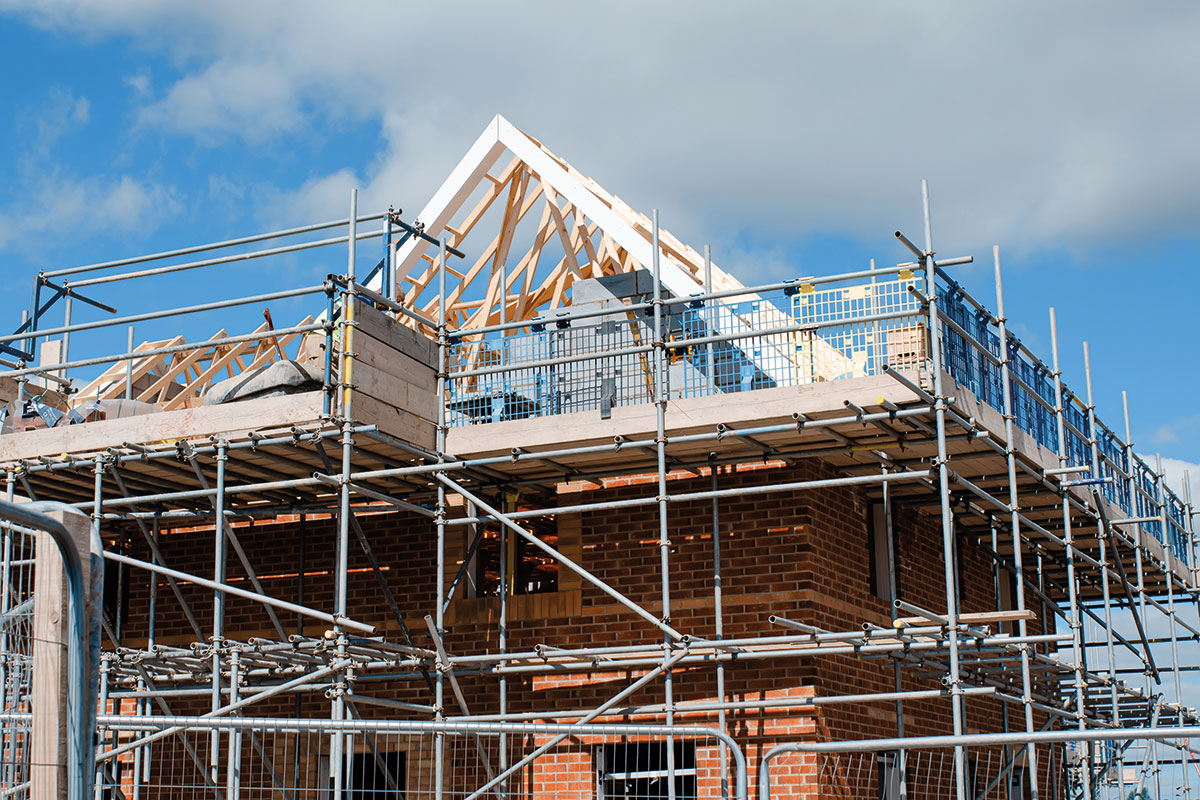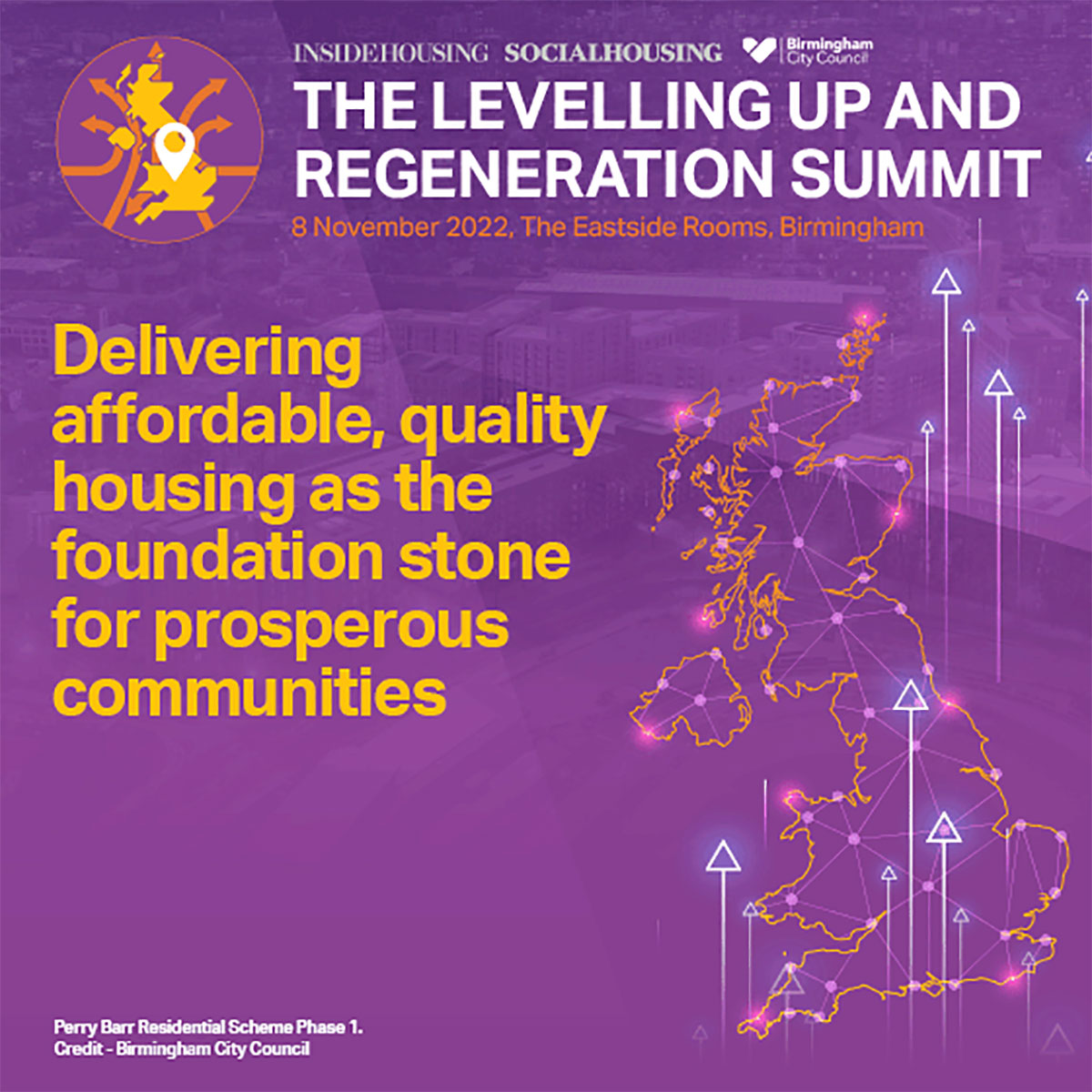RSH chief: improving quality of existing homes is ‘top priority’ for government
Improving the quality of existing homes is one of the top priorities for government, the chief executive of the Regulator of Social Housing (RSH) has said.
Fiona MacGregor, who announced earlier this week that she would step down from the organisation in the new year, was speaking at the Housing 2022 conference in Manchester today (28 June).
Ms MacGregor said that the sector’s performance on quality housing and repairs was “under the microscope like never before”, with the regulator being asked about it “on almost a daily basis by the Department [for Levelling Up, Housing and Communities]”.
The outgoing RSH chief executive referred to the government’s target, set out in its Levelling Up White Paper, of reducing levels of non-decency in all rented homes (including both private and social) by 50 per cent by 2030.
“You can expect to hear much more from the secretary of state and ministers about this mission in the coming months. Improving the quality of existing social housing is one of the top priorities for this government.”
Ms MacGregor added: “I think it’s fair to say that the poor conditions that we have all seen in recent media reports may not be representative of the majority of social housing tenants’ experiences. However, where failings occur, how they are addressed speaks to the reputation, and the values, of the sector.”
The RSH’s chief executive also warned that while there are undoubtedly pressures facing providers, and that “complex cases” exist, providers need to be honest about those, and to “treat tenants with the respect they deserve”.
Earlier today, Gavin Smart, chief executive of the Chartered Institute of Housing (CIH), referred to a new independent panel launched by the organisation together with the National Housing Federation, to be chaired by Helen Baker, which will make recommendations for taking swift action to tackle poor-quality housing in the sector.
“In my view, collective reputational damage needs a collective response,” Mr Smart told the conference. “We need to do more to understand why these issues have been happening and what action we can take to do better.”
The panel will be made up of people with “lived experience and expertise in social housing”, the CIH has said, and will meet over the summer with residents, community leaders, and other partners to consider improvement actions.
Data ‘mismatch’
In her address to the conference, Ms MacGregor emphasised the need for good-quality stock condition data to ensure effective asset management. She revealed that the potential “mismatch” between providers’ reported compliance with the Decent Homes Standard and the actual quality of homes was one of the key drivers of the ministerial interest she had highlighted.
“When we launched the Statistical Data Return this year, we reminded you of your responsibility to ensure the accuracy of your reporting of compliance with the Decent Homes Standard.
“Accurate data is essential for ensuring you know about the health and safety and quality of your homes.”
Ms MacGregor added: “It is also necessary for business planning, particularly in the context of long-term investment demands to deliver not just decency but also building safety, decarbonisation and new homes.
“Providers can expect even greater scrutiny of your investment plans, spending on maintenance and major repairs and stock condition data through upcoming stability checks and [in-depth assessments].”
Earlier today, new research by consultancy RESAM in collaboration with Social Housing suggested that almost half of providers are cutting back on their development plans over the next five years as a result of prioritising investment in existing homes – including in relation to decency and energy efficiency.
The head of the RSH also spoke about the Social Housing Regulation Bill currently passing through parliament and the incoming consumer regulation regime. Ms MacGregor said that the bill is an important milestone in delivering the aims of the government’s Social Housing White Paper, but that it is only “one piece of the puzzle”, with other steps required by stakeholders in the sector.
She urged providers to make sure they are not only taking action, but also seeing results. “For you in the sector who have listened and acted upon our, by now prosaic, message to ‘act now’, you should be seeing signs of positive change within your organisations.
“But more to the point, tenants should be seeing those signs, too. In the unlikely event that any of you haven’t taken action yet, I would suggest that you have forgotten what you are here to do.”
Economic health
The topic of rising inflation, interest rates – and what this should mean for rent-setting in housing – was also raised.
Ms MacGregor said that the regulator recognises that the sector faces difficult trade-offs as a result of rising rates and inflation, and she referred, too, to the impact of labour shortages on frontline and specialist staff recruitment and retention.
“You are operating in very tough conditions when the sector is being challenged to deliver more. It is vital that boards and management teams test their plans for responding to current conditions and how they might affect your ability to deliver key services to tenants.”
On rent-setting and the financial pressures facing tenants, Ms MacGregor said: “The steep rise in the cost of living for tenants, alongside the end of the temporary uplift in Universal Credit is, rightly, on everyone’s minds. The rising cost of food, energy and other essentials mean tenants may be under particularly acute pressure… And it is in the context of those pressures that you are thinking about rents.
“The choices you have over next year’s rent-setting are incredibly difficult given the trade-off between the impacts of inflation on your business and the pressure on tenants. There is a difficult balance to be struck here and boards will be asking themselves how to balance those difficult questions.”
Asked further about this during an audience Q&A, and on the potential for ministers to intervene in rent-setting, Ms MacGregor reiterated previous messaging from the regulator that government was not actively considering this.
“At the moment we don’t have government showing any intention yet of getting involved [on rents], which is not the same as saying that it might not think in due course that it should,” she said.
Ms MacGregor said that landlords should not be “ducking” these questions by waiting to see whether government makes the decision for them. “Boards have to be thinking about what choices you will make come the autumn [if there isn’t a government policy on this] because those hard decisions will fall to you.”
Reputational risk
Ms MacGregor also referenced the reputational risk facing the sector, which she said is “inextricably linked” to all risks faced by a registered provider.
“As organisations with a social purpose, the majority of which have charitable status, providers’ actions will continue to be scrutinised by a range of stakeholders.
She added: “It will not always be easy – and sometimes it won’t even be fair, but it is imperative that boards understand who their stakeholders are and what their expectations are, with effective mitigation strategies in place to manage reputational risk across their activities.”
Ms MacGregor said that the sector has a positive story to tell about its willingness to meet the significant challenges it is facing, but that for the time being this might not “cut through” amid wider criticism.
“The imperatives for delivering on building safety, decent homes, energy efficiency and new supply are each individually undeniable. And at the same time we have had nothing but uncertainty for several years now. But despite the significant challenges that you have faced, the sector has shown itself to be willing to meet those challenges,” she said.
“The sector has a positive story to tell. For the time being, though, that may not cut through until stakeholders are persuaded that some of the current criticism has been taken on board and responded to.”
The call to action to address concerns echoed comments Ms MacGregor made at the top of her speech. The chief executive referred to the fifth anniversary of the Grenfell Tower fire, the upcoming completion next month of the public inquiry, and the report with recommendations for change that will follow.
“There will no doubt be lessons for all of us who work in housing in that report – both in the sector and wider housing industry, and across local and national government,” Ms MacGregor said.
“The onus is on all of us to demonstrate to those affected by the fire that we hear those lessons and are committed to meeting our responsibilities for delivering safe homes, whether as landlords, local authorities, regulators or contractors to the industry.”
Sign up for The Levelling Up and Regeneration Summit
The Levelling Up and Regeneration Summit is a one-day event examining how the social housing sector can deliver affordable, quality housing as the foundation stone for prosperous communities, in whichever area of the UK they may be located.
This summit is set to deliver some much-needed insight and thought leadership around housing and its role in the levelling-up agenda.
Find out more and book your delegate pass here.
RELATED







